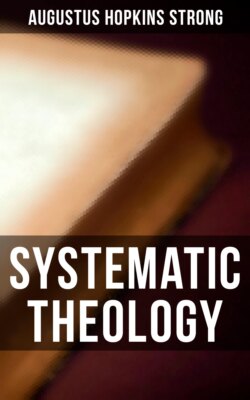Читать книгу Systematic Theology - Augustus Hopkins Strong - Страница 9
На сайте Литреса книга снята с продажи.
II. Aim of Theology.
ОглавлениеTable of Contents
The aim of theology is the ascertainment of the facts respecting God and the relations between God and the universe, and the exhibition of these facts in their rational unity, as connected parts of a formulated and organic system of truth.
In defining theology as a science, we indicate its aim. Science does not create; it discovers. Theology answers to this description of a science. It discovers facts and relations, but it does not create them. Fisher, Nature and Method of Revelation, 141—“Schiller, referring to the ardor of Columbus's faith, says that if the great discoverer had not found a continent, he would have created one. But faith is not creative. Had Columbus not found the land—had there been no real object answering to his belief—his faith would have been a mere fancy.” Because theology deals with objective facts, we refuse to define it as “the science of religion”; versus Am. Theol. Rev., 1850:101–126, and Thornwell, Theology, 1:139. Both the facts and the relations with which theology has to deal have an existence independent of the subjective mental processes of the theologian.
Science is not only the observing, recording, verifying, and formulating of objective facts; it is also the recognition and explication of the relations between these facts, and the synthesis of both the facts and the rational principles which unite them in a comprehensive, rightly proportioned, and organic system. Scattered bricks and timbers are not a house; severed arms, legs, heads and trunks from a dissecting room are not living men; and facts alone do not constitute science. Science = facts + relations; Whewell, Hist. Inductive Sciences, I, Introd., 43—“There may be facts without science, as in the knowledge of the common quarryman; there may be thought without science, as in the early Greek philosophy.” A. MacDonald: “The a priori method is related to the a posteriori as the sails to the ballast of the boat: the more philosophy the better, provided there are a sufficient number of facts; otherwise, there is danger of upsetting the craft.”
President Woodrow Wilson: “ ‘Give us the facts’ is the sharp injunction of our age to its historians … But facts of themselves do not constitute the truth. The truth is abstract, not concrete. It is the just idea, the right revelation, of what things mean. It is evoked only by such arrangements and orderings of facts as suggest meanings.”Dove, Logic of the Christian Faith, 14—“The pursuit of science is the pursuit of relations.”Everett, Science of Thought, 3—“Logy” (e.g., in “theology”), from λόγος, = word + reason, expression + thought, fact + idea; cf. John 1:1—“In the beginning was the Word.”
As theology deals with objective facts and their relations, so its arrangement of these facts is not optional, but is determined by the nature of the material with which it deals. A true theology thinks over again God's thoughts and brings them into God's order, as the builders of Solomon's temple took the stones already hewn, and put them into the places for which the architect had designed them; Reginald Heber: “No hammer fell, no ponderous axes rung; Like some tall palm, the mystic fabric sprung.” Scientific men have no fear that the data of physics will narrow or cramp their intellects; no more should they fear the objective facts which are the data of theology. We cannot make theology, any more than we can make a law of physical nature. As the natural philosopher is “Naturæ minister et interpres,” so the theologian is the servant and interpreter of the objective truth of God. On the Idea of Theology as a System, see H. B. Smith, Faith and Philosophy, 126–166.
